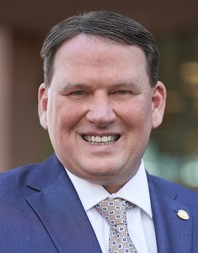Expanding Diversity in Healthcare
Too few Black healthcare professionals in the healthcare system is one of many challenges that has a disproportionate impact on Black Americans. To help address this disparity, we're investing in students in health and sciences fields at three historically Black Colleges and Universities (HBCUs): Meharry Medical College, Morehouse School of Medicine and Tennessee State University.
 As part of our Activating Change Today (ACT) initiative to advance racial justice, we've committed to funding of $1.2 million in scholarships and grant funding.
As part of our Activating Change Today (ACT) initiative to advance racial justice, we've committed to funding of $1.2 million in scholarships and grant funding.
Gid E. Rowell, EdD Assistant Vice President for Donor Engagement and Philanthropy at Morehouse School of Medicine, offers insight on why increasing Black representation in these fields is critically important and how programs directly impact students.
Q: Why is it imperative to increase the number of Black healthcare professionals?
Rowell, EdD: According to the Centers for Disease Control and Prevention (CDC), although Black Americans are living longer, they are still disproportionately affected by chronic disease and die earlier from these diseases. Studies show that Black patients have better outcomes when treated by Black doctors. Yet, Black clinicians comprise only 5% of the physician workforce and 7% of all medical students in the United States.
Cultural competency matters. Developing and training more Black and underrepresented providers will help us build trust between medical professionals and community members and improve patient outcomes.
Q. What benefits do pre-medical programs like the Undergraduate Health Sciences Academy (USHA) at Morehouse School of Medicine offer?
Rowell, EdD: Historically Black medical schools produce the majority of Black doctors, however, right now there are only four programs in the United States. With more programs, additional qualified attendants could participate if given the opportunity.
In addition, the cost and the potential of crippling debt is often a limiting factor. Making financial assistance accessible and available encourages more students to enter and graduate from medical school.
Q: What value do partnerships between educational institutions and healthcare companies like Baxter provide?
Rowell, EdD: Partnerships like the one between Morehouse School of Medicine and Baxter support and empower Black students to pursue medical and scientific careers by funding important educational initiatives. Specifically, the funding will support several initiatives within the Morehouse School of Medicine (MSM) Undergraduate Health Sciences Academy (UHSA), a pre-medical targeting program designed to assist undergraduate scholars as they pursue medical school admissions, as well as provide support for student research stipends, Medical College Admission Test (MCAT) preparation for students and related instructor grants.
Q: What accomplishments have graduates of the Morehouse School of Medicine and related pipeline programs been able to achieve following graduation?
Rowell, EdD: Earlier this year, we were able to give out 156 academic degrees, including 81 medical degrees. By creating and expanding our health and sciences programs, we are educating and training more Black and culturally competent doctors. These doctors will ultimately be able to reach their communities and provide an opportunity for better health care that saves more lives.
Baxter Scholars Award
Learn about our commitment to expand the pipeline of black students in health and sciences fields.